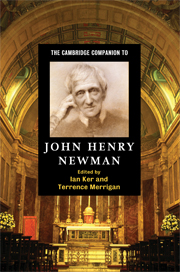13 - Newman in retrospect
Published online by Cambridge University Press: 28 May 2009
Summary
Writing in the heyday of 'modernist rationalism', John Henry Newman's analysis of the fiduciary roots of all inquiry - an argument reproduced in our century by Hans-Georg Gadamer - offers us a benign understanding of the 'postmodern': that one ought not simply oppose knowing and believing, notably when the object of belief is divine revelation. Yet in finding room for faith, his mode of argument resists including any belief whatsoever under that rubric. So the quality of discernment whereby one discriminates among different modes of faith represents a primary and indispensable use of reason. Like Socrates, Newman believed in the capacity of human intelligence to discriminate, with proper tutelage and catechesis, the relevant from the spurious. In fact, one always hears the tutor in his writings, as he poses issues in commonplace ways only to lead us to greater appreciation of the nuances needed to move beyond oppositional clichés or crude descriptors like 'modernist rationalism' (found in the opening sentence of this chapter). Newman's preponderant legacy, I suggest, lies in teaching us how to elude distracting oppositions by effectively neutralizing their appeal.
- Type
- Chapter
- Information
- The Cambridge Companion to John Henry Newman , pp. 255 - 274Publisher: Cambridge University PressPrint publication year: 2009



